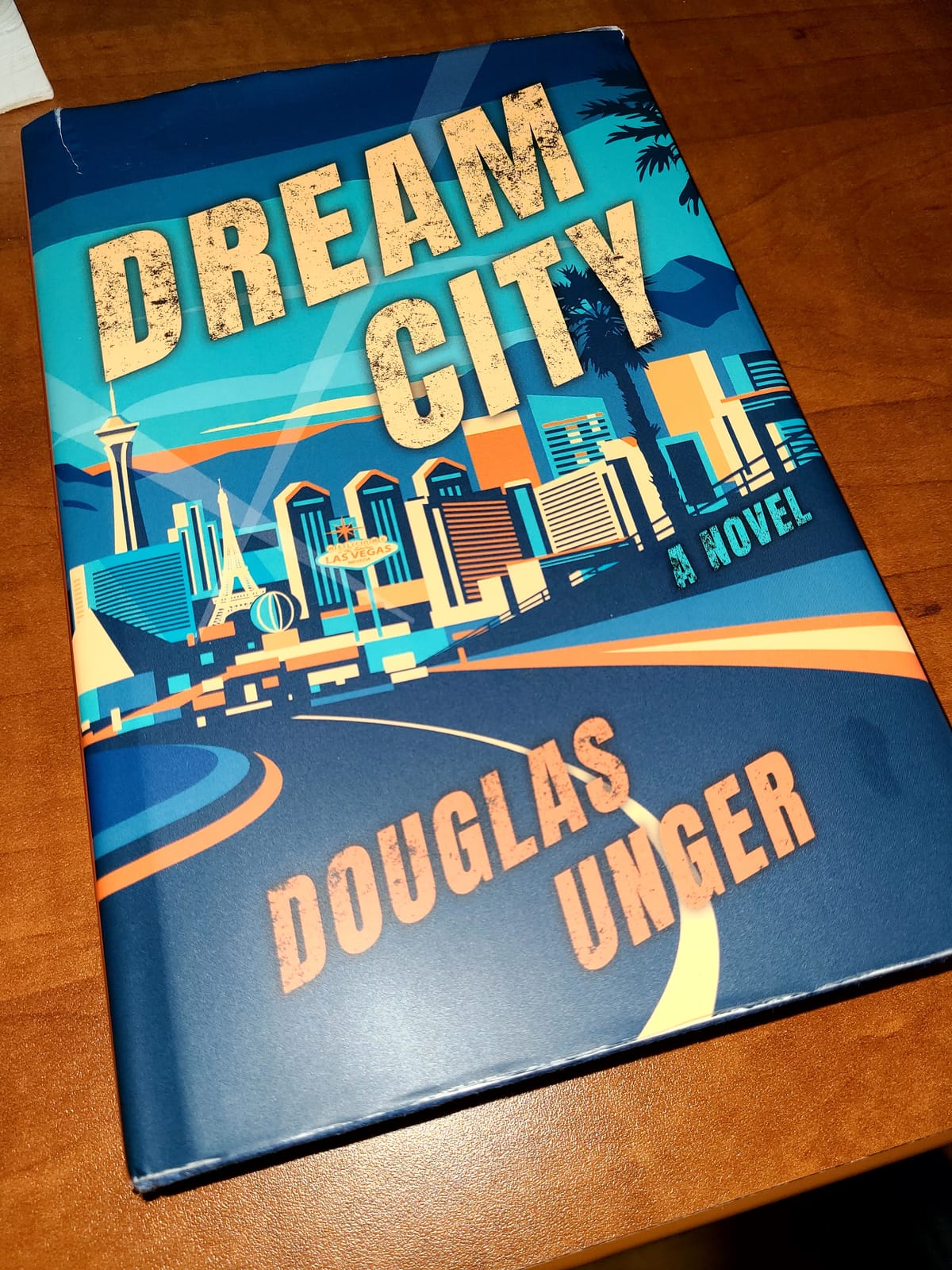American Disillusionment in Literature: Exploring Dream City, Cat's Cradle, and The End of Vandalism
On how Douglas Unger, Kurt Vonnegut, and Tom Drury capture American disillusionment through their distinctive literary styles and cultural critiques.

I've been plowing through an eclectic mix of books, from ancient epics to contemporary small towns, with some philosophy in between. These books weren't selected as part of any deliberate reading plan, but they've nonetheless echoed a sense of disillusionment that's been bothering me in my own inner conversation.
Dream City by Douglas Unger
Dream City challenged my own sensibilities of how a book should work: for me, I think heavily in scenes, and then from there, I meld together other things like thought, theme, etc. But what Unger is able to do is tell a story about Vegas through a main character, Reinhart, that perfectly reflects an American bootstrapped rise and fall tale of the middle class. It condemns greed and the obsessions we as Americans are taught to cultivate.
One passage in particular has stayed with me: "She had learned too late (if she had ever learned) that a life spent in service to fame could be so thankless, and so lonely. What else is marketing but a lackey to fame, always for something or someone else?" Much like Greta (the "she" here), most of us spend our American lives in service to money, to online fame, to so many things that feed the greed of others while shrugging off the beauty that is in our individualistic nature.
You should read it, especially if you've liked anything I've done: he's one of my best mentors who had the uncanny ability to answer questions that I hadn't even asked yet.
Cat's Cradle by Kurt Vonnegut
The thing that most lingered with me wasn't the dark humor or its apocalyptic nature, it was how Mona Aamons was strikingly beautiful but completely disinterested in sex. It's the sort of gap that doesn't get written very often, and I appreciated it. But, overall, I couldn't really get into Cat's Cradle. I wonder if it has something to do with how its darkness feeds off a cultural moment when people were watching The Andy Griffith show and trying really hard not to think about the dark bounties of life, of their inventions, and so on.
My generation, and the ones following, have grown up sneering at the happy-go-lucky stories of our parents' generations. We grew up thinking that American History X was high school and that Batman wasn't Batman until he was brooding and depressed. Not too long ago, I asked a class of students if there were any heroes in real life. They, 18-22 year olds, emphatically told me that there weren't. There were protagonists, but there was nothing so pure or true as a 'good' hero.
When I turn on the TV, and I see our cockroach demon tribute band parading about in government, denouncing a democracy fighting for its life against a tyrannical nuclear power and its stooges, doubting vaccines, and furloughing veterans (who make up much of the federal workforce) as significant scourges on our debt. (Never mind the money given away and the taxes unpaid). Climate rage is flooding the hills and roasting the palisades. Maybe Cat's Cradle feels less like satire and more like a premonition.
Emily Wilson's Translation of The Iliad
I've been thinking a lot about Wilson's translation of The Iliad. In fairness, I've only read a sliver of it, in a Norton Anthology I'm using for a class I'm teaching. Yet, what I have read feels less urgent than the Stanley Lombardo translation. It might be that the Lombardo was my first exposure, and it started with "Rage:" and then started the tale. (And there's that fantastic line about pitching the souls of heroes down to Hades). This isn't to say that Wilson's is bad. It's accessible, uses pentameter in a way that feels more comfortable in English and probably is closer to the original experience of hearing a bard sing of Achilles, rather than the poetic pouncing of Lombardo's translation.
Justice by Michael Sandel
I read Justice once, and I think it's fantastic because it does a lot to challenge the ideals of cultural relativism and reactions to older sensibilities that I grew up with in academic culture. Sandel's idea that government does have a fundamental role in inspiring what is the good life and a moral life is compelling. It's something I'm going to read again.
The End of Vandalism by Tom Drury
I've read pieces of The End of Vandalism (parts appeared in the The New Yorker) and heard about it for a very long time, but never had the patience to sit and read. It's hilarious. It pairs well with Annie Proulx's That Old Ace in the Hole. However, it was slow, like eavesdropping stories at a small town diner that's known for its pies and its recycled coffee grounds. Plenty of things happen, wonderful gossip consumed, yet there's always this sense that mythologizing the day-to-day struggles in its small talk of small towns is really the affection for those from the towns. Which is endearing, and at first distancing. Yet, that window of insight is a wonderful breath of fresh air from the overwhelming amount of stories set in our urban spaces.
In other news:
- An old story of mine showed up in EastOver Press's An Anthology of Rural Stories by Writers of Color, 2024
- I got selected for to be a fellow at the Virginia Center for the Creative Arts this summer.
- I've been doing a lot of reading into magic (Magic by Chris Gosden is a wonderful read on what magic is and isn't to the human experience) and stock trading for the book I'm working on.
- You should pick up Rosa Kwon Easton's White Mulberry if you liked Min Jin Lee's Pachinko. If you didn't like Pachinko, you'll probably like White Mulberry more.